mali 9: douentza --> koro
per usual we awoke at half five with the sun already up, though not yet hot. alex and i were keen to hike to the cliffs that were visible across a few verdant kilometres outside of douentza. we took off down the road, eventually settling on a dirt road that went in the general direction, between some houses and into the fields behind. the cliffs were of a size and at a distance so as to appear very remote.

along the way, we passed a few people on bicycles heading into douentza, through the fields. alex began to tell a joke to pass the time: so this guy gets fed up being made fun of and goes to joke telling school...
it's a good joke; half an hour later the punchline hits. we've been walking for quite a while - several km - and the escarpment looks about the same as it did when we started. but it is getting much hotter and the ground is starting to suck with each step. we're wearing flip flops, but have brought our track shoes for the climb ahead.
very shortly it becomes impracticle to dodge puddles and the trail we follow submerges into an amorphous swamp, a river running over its banks. it gets deeper but we're wearing shorts; soon the water is up to our knees and then to our hips. we pass a few people coming the opposite direction, carrying their bicycles and baskets above their heads and smiling as we slog through the morass. eventually i start to loose my flip flops in the thick mud below the water and take them off to walk in my bare feet. the water is up to mid-chest before the ground slopes upward again; a man perches high on his camel's hump, passing us and looking rather smug i'd say.
when we get back to dry land, restore socks and running shoes, we are in a small village at the base of the escarpment. with nowhere to go but up, we plow carefully through a cornfield and begin the climb. it's fairly easy going, a lot of scrambling and before long we're halfway, wheezing lightly and resting in the shade of a boulder looking out over the valley we crossed in the morning. from here, the swamp is clearly a swollen stream, spreading out over the maize fields and running along the base of the escarpment. the valley is shocking, bright green and the dim shape of a tall radio tower in douentza is visible through the haze.
we press on for the top, but realise it's probably out of reach without technical climbing gear. we ascend the spine of a ridge; looking below, on both sides of the ridge, the crumbled stone foundations of nearly abandoned mud hut villages, with flocks of goats and the odd goatherd in their avenues. the sun is high now and it's pretty hot.
on the descent, we make better time, passing through a few rockstrewn fields of lush grass. back into the cornfield, onto the village path. we decide to follow the path along the stream to the main road; at first we feel a bit lost, but arrive eventually. where the river crosses the road is paved, but a foot deep in swift running water. just up river, off the tarmac, a herd of cows lumbers awkwardly through the river. lumps of cow turd float past us, but we're thirsty so we fill the bottles and purify them with iodine for 10 minutes, standing in the middle of the road as trucks and 4x4s pass us. no one seems inclined to give us a lift, but we're worried about making it back to doentza to catch our cab to koro.
eventually we make it - everyone is in he huge market; naturally, we have to wait for a few hours before the cab is full to leave town. we spend the time shopping for CDs and food.
mali 8: timbuktu -> douentza

we awoke restless in the desert - early, because we had booked seats in a 7am 4x4 (quatre-quatre, or cat-cat) to douentza, from where we would stage our trek into dogon country. we grumbled a bit about timbuktu's limited tourist potential when "sleeping under the saharan stars" meant being swarmed by beetles, scorpions and mangy (but cuddly) kittens as you huddled together for warmth on a plastic tarp, with only a thin gruel of rice and sauce for comfort. that, and the fact that at about $25 per person, it was the most expensive outing of our trip so far. we reckoned that, given the brevity of our journey (2 instead of 10km) and quality of accommodation, we would ask the guide who arranged the trip for a discount. before we set out, however, we hit the tuareg pipe:

when we got back to timbuktu, the 4x4 was waiting. we loaded up our stuff and the guide showed up for the second half of his fee. then things got complicated. we asked for a discount for the aforementioned reasons. the guide refused, pointing to the negotiation. we pointed out that we did not get what we negotiated and that the so-called 'guide' didn't guide anything except, perhaps, a land rover of tuareg traders to our exact location the desert, for which, no doubt, he received some kind of commission. hence, having failed to live up to the terms of the contract, he should discount the trip. he was incensed. first, he ordered the 4x4 not to leave until he got what he felt he was owed. this was bad because the road to douentza went through some pretty harsh desert and was bad to begin with - not a place you wanted to break down in the middle of the day, hence the early departure. second, he threatened that if we did not pay him, some 'tragedy 'might befall us along the road, or in mopti, or basically anywhere we went. we did not want to find our recently purchased tuareg daggers lodged in our backs. sarah, ingeniously, broke down the guide's argument and turned the crowd of passersby against him - negotiations about money aside, who could condone threatening a group of tourists? eventually, the conversation became less about the money and more about saving face for the guide - he couldn't accept a discount under pressure, because it would embarass him. eventually, he agreed to a token discount which would allow us to get on our way and him to save face. amidst his profuse apologies, he pocketed the rest of his 'fee' - of which the tuaregs who actually led the trek saw only a fraction, probably. on the way out of town, we left a message at the police station that if we didn't arrive safely in mopti, they had the name of a guy to start the investigation. and with that, we were off, the six of us crammed into the luggage compartment of a land rover juryrigged for four.

after a long hot journey through the desert, the land became lush, wet, green and very hot. we pulled into douentza as the sun was going down. though mainly an eclectic strip along the paved road heading back to mopti and eventually bamako, douentza was an oasis after the remoteness of timbuktu. we took up residence for the night in a well-touristed hotel in a stand of palms, staking out spots on the roof with our mosquito nets. then, we descended into the courtyard for dinner among a group of blond, sunburned nordics. after drinking a flag and eating a meat skewer, i crashed gratefully into the foam pad below the lime green net.
mali 7: timbukthree
i left off (ages ago) as we departed by camel into the sahara north of timbuktu, led by tuaregs in midnight blue robes. the sawing of the camel saddles chafed uncomfortably. in a way, i was glad we were only doing 2 of our promised 10km. flies swarmed around the camels ears, around your feet propped crosswise in the crook of its neck; its head yaws left and right and you creak back and forth abruptly in the saddle.

when we get to the encampment (a solitary dome in amidst the dunes) we shuck off our camels (i as quickly as possible) and repair to plastic mats that have been laid to receive us. slowly it dawns on us that we will sleep on these same plastic mats "under the stars". our host prepares tea:

we can still see the city lights as a red line on the horizon once the daylight goes but it is quite dark; the tuaregs have led the camels off elsewhere. as we sip the three teas {bitter like life, mild like death, sweet like love}, some traders wander out of the desert and spread their wares on the ground. we are trapped, and commence to haggle, trying to get out without purchasing the whole lot. there are camels teeth inlaid with brass, knives with molded leather handles, necklaces, bracelets, curious silver pipes (long, fluted) that the tuaregs use to smoke their particular brand of tobacco. i seize upon a trio of knives with leather handles and matching leather sheathes. the traders separate us so that we cannot easily compare the prices we are getting with each other. because it is dark, they illuminate their goods with the backlight form their mobile phones. my trading partner is relentless, informing me that tuareg tradition is to have three rounds of trading: the first is to throw out your most ludicrous offer (perhaps just to break the ice; he is nonplussed when my offer is "i don't want to buy those knives" whilst his is about $10 per); second, you raise and he lowers. the third bid is meant to be your final offer - i went in at about 20% of his first ask, which meant (he informed me) that his children would starve. but he would take it, ultimately, because of the special bond we shared as participants in the tuareg trading ritual. i pocket the knives, fork over the cash, and we share tea. the traders leave; a short distance from the encampment, a land rover roars into life and drives back to timbuktu. ladies and gentlemen, the tuareg claw.
we are fed a bowl of rice with thin sauce that barely makes it around the 6 of us; when we ask for more food, our host serves us from his own family's meal, which is a much better type of rice basking in butter and topped with small pieces of succulent lamb.
we settle in for the night, stretched out on the plastic mats; all around us, the clattering noise of large beetles and locusts and the scurrying of the tuareg's kittens as they guard the perimeter, pouncing on anything that moves. once i realize what they are doing (keeping away the scorpions, in addition to the larger sand beetles), i stop kicking them away and one curls up next to my face.


mali 7: timbuktwo
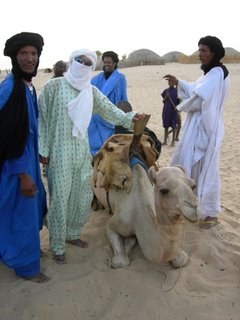
alex examines his mount
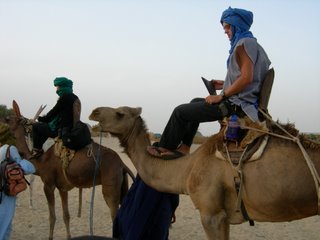
easy there, boy!
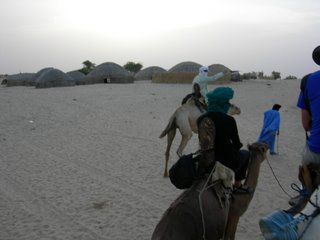
we set off as the sun was setting, after a lengthy dispute about our return time the next day; in order to get a taxi out of timbuktu to get to douentza - a 7 hour 4x4 trek through the desert (well, the plains, anyway, but on a dirt road) - we would have to leave early in the morning - or so we were told; this meant, we would have to return earlier than we anticipated, something our "guide" didn't think was in our contract, not that it existed. not that he was really even our guide, because he didn't even come with us. but the rest of that story waits for tomorrow. the interesting thing about the camel trek was that while we rode the camels, the tuaregs walked, which meant that we could only go as fast and as far as the tuaregs wanted, which was, albeit, a fairly good clip. but the time constraint that we imposed meant that instead of going way out into the desert, we would only be going out a short distance - this is also because we were late to depart and the sun was falling.
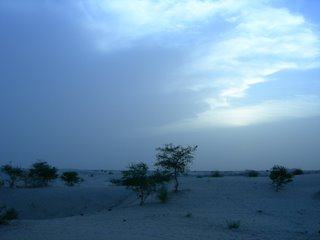
and it was very beautiful;
next time: at the tuareg encampment
mali 7: timbuktu
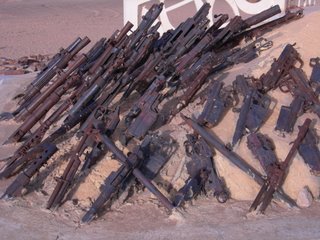
alex and i woke up early to wander the town before the desert heat. the hotel at which we were staying - desert paradise, or something - was literally on the edge of town, before the brick buildings disappeared and a slim band of tuareg skin tents separated us from a practical infinite desert to the north. at this border, a monument, commemorating the cease fire between tuareg rebels and the malian government, called the flame of peace - at this site, they burned 3000 firearms - those that survived were cast into the cement as a reminder.
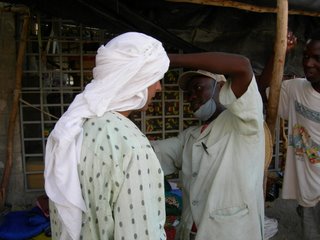
alex gets fitted for a turban - from this point onward, he would constantly be considered muslim, which lent us great credibility!
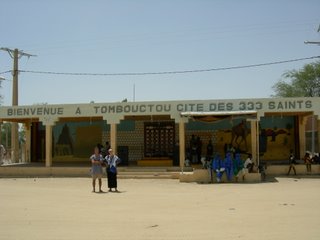
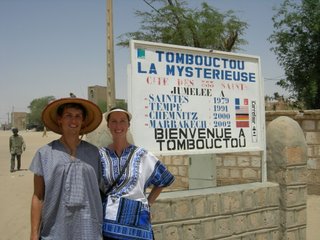
i'm not sure which of these slogans is better: "timbuktu, city of 333 saints"? or "timbuktu the mysterious"? we spent a good deal of time trying to figure out just exactly what was the mystery of timbuktu - eventually solving that the mystery was, why does anyone come to timbuktu, this dusty town on the edge of the desert, full of thieving tuaregs? no - actually, i think those are precisely the reasons.
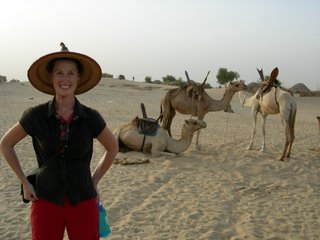
this night we were going to ride camels out into the desert and spent the night at a tuareg encampment, and so had to complete our day of sightseeing by 4pm, at which time we would meet our tuareg guides. this is when things started to get really cool.
mali 6: disembarkation
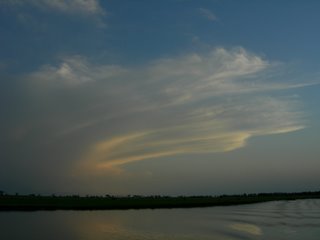
great sunrises on the river
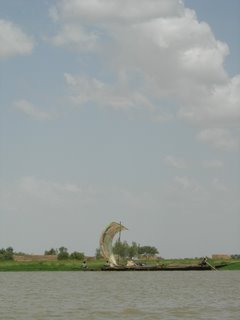
once we got further down river, we began to see some sail-pirogues, which were a change from the pervasive hand-poled pirogues.
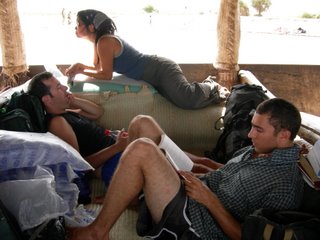
it more or less conveys the passage of time on the boat - cramped quarters (although relatively spacious) - reading books, watching the scenery, suffocating from the
heat, trying to catch up on sleep, etc.
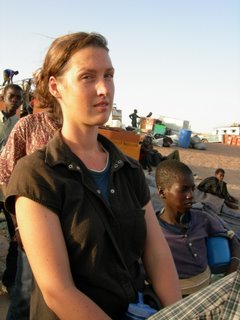
after 3 days on the river, we finally arrived in kourioume, which is the port for timbuktu - my guess is that timbuktu actually used to be on the river, but it changed course and now the river is about 20k away. as the look on sarah's face suggests, we were pretty exhausted when we got there, and still we had to haggle over the ride to town - out of principle; who was going to pay the 50 cent baggage fee? not me!
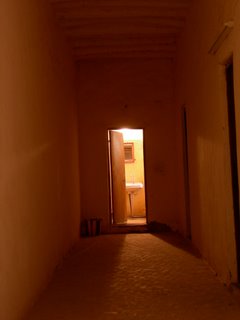
we managed to pick up several new tuareg "friends" during the brief journey form kouriome to the auberge where we were staying; once some new white people roll into town, every single person finds out about it and the "guides" and salesmen will wait outside your hotel from 6 in the morning for you to emerge and, hopefully, hire their services or buy their wares. man - we thought the sell in mopti was tough, but the real claws came out once we got to the desert. eventually, you just had to insult whatever tuareg was following you so he would leave you alone. this was somewhat nervewracking, as their wares mainly consisted of knives. but unlike the mopti sell, which was hard up front, the tuaregs are silky smooth in their approach, with lots of
smiles below blue-turbaned heads. but the hotel was something of a sanctuary, as they would stop following you at the gate. the walls were thick and they cut the heat.
mali 5: on the boat
this is a montage of the second day of the journey, one of languid reading and attempted sleeping. we were mocked by the rest of the boat for putting up mosquito nets, although the real problem, as previously mentioned, was the total lack of thought that went into our sleeping arrangement. even though we had maybe 3 times as much space as the average african on the boat, i reckon we got about 1/3 the sleep. eventually, alex and i had to end of sort of spooning, on opposite sides of a millet sack, because we were sharing a mosquito net. on the flip side, no sleep meant waking up for an amazing sunrise.
it was on the afternoon of the second day that we saw the hippos just off the side of the boat - i couldn't get my camera out in time to photograph them, but there were 3 or so paddling around, surfacing, submersing, and it was very cool. everyone else was excited as well, i think.
we kept putting into small towns along the way, mainly to pick up passengers although occasionally to offload some cargo. the terrain began to get more and more sandy as we went north, going from very green rice fields to desert down to the waters edge. it was crazy going up this river, and having the desert on all sides, and then seeing someone walking along the riverbank in the heat of the day in the middle of nowhere. or sometimes we would see a pirogue miles from any river town. there were some fishermen, checking their lines, as well.
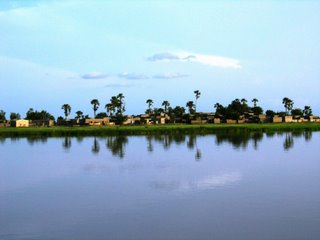
1. a town we passed that looks like an oasis.
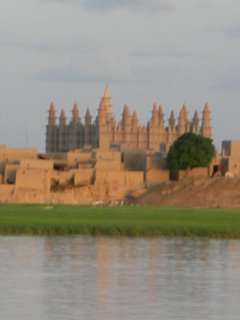
2. again, a town in the middle of nowhere and a tremendous mud mosque towering over it.
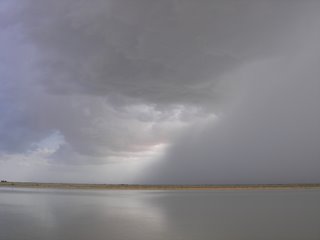
3. as you say from yesterday, we could climb up on top of the boat, which was a nice place to be - i think we got special treatment for being white - also, we made a ritual offering of tea and sugar to the chef du bateau who had the pimp cabin up in the front of the boat - because none of the other passengers were up on top of the boat at all. but it was a great place to see the river, get in the sun a little bit, escape the smell of the cooking fires. but on this day, just after we got up on top, the crew got frantic and were like, get down, get down and off on the east bank we saw the sand begin to kick up and the sky darkened along the fault line of an approaching storm, which moved so fast that we barely had time to swing down from the roof before it hit, where 30 seconds earlier it had been clear and sunny. unfortunately, my shorts and my kenyan blanket were drying from a previous rainstorm and got blown into the river by the sudden wind. when the storm hit, they battened down the hatches, such as it was, by unfurling the tarpaulin down the sides of the boat, completely shutting it off from the daytime - we were about to suffocate from the smoke when, in the process of bringing the boat to the lee side of the river, our captain promptly ran us aground. so, a bunch of people jumped out into the river with a tree trunk and levered the boat off the sand bar in the middle of the pouring rain and in a second the rain ended and we kept moving.
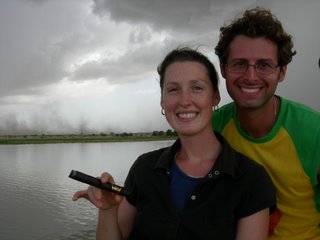
4. this is a good posed picture we were taking before we noticed the tornado forming behind us - (!)
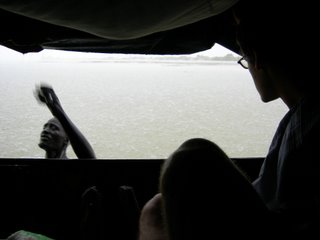
5. and the first mate up to his chest in water, yelling at people to close the tarps and simultaneously calling for volunteers to help lever the boat. chris, my sister's boyfriend, obliged, much to the amusement of all the africans.
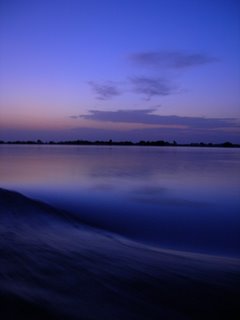
6. once the storm cleared, it left some amazing sky behind.
mali 4: embarkation from mopti
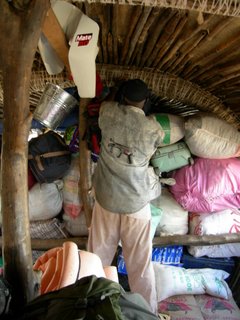
so, the next three days in the series sort of blend together, as we spent them all on the aforementioned cargo pinasse in an area about 10' by 6' full of cement and millet sacks. in theory, the grain sacks are moldable and, carefully laid as they are, create something of a flat floor surface upon which you can sleep, eat, etc. in reality, they are a treacherous geography of crevices and pits in which you are constantly stepping and, when sleeping, rolling, which forces your body to take the same kinks as the gap between the millet sacks. so, one of the reasons why all the days blend together, besides the obvious fact that the river scenery was pretty consistent, is that i didn't get any sleep the whole time. but it's all good, because this guy had an automatic weapon stiched to the back of his jean vest.
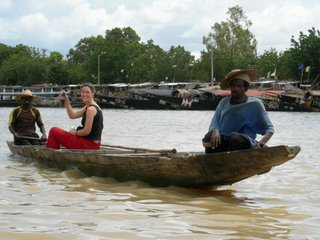
so, when we booked passage on the pinasse, the touts (or travel agents, such as they were) assured us that this was the only boat leaving tuesday, which is what we needed, and further warned us that the boat would be full and leave at 10am sharp. so, we had to get up early, get into mopti and buy supplies, including cases of water satchets. well, i don't know why we listened to this warning in a part of the world where time literally has 0 meaning, at least as we understand it by DC standards. at least we didn't miss the boat. i mean, we didn't miss it by a long shot. i think we set off sometime past 3 pm, which, all things considered, wasn't too bad. mainly, it gave sarah ample time to flag down a passing pirogue, and get him to take her straight from the side of our boat to the bar across the harbor for cold cokes.
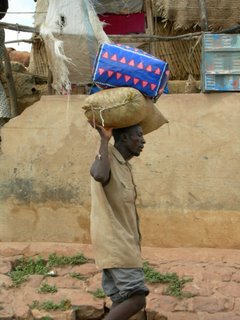
loading the boat was interesting, because it, like everything, is done by manual labor. they started off running a plank into shore up which people could walk without getting wet - then, because no one else profits from the plank, they pulled it in and all those pirogues swept into the breach, maybe five deep between the boat and the landing. so, now you either had to walk in water up to your chest and hoist yourself up into the pinasse, or you could pay each of the intervening pirogues like 5 cents to allow you to step in their boat and cross. in this context, people were loading these 100kg sacks of millet, motorcycles, sacks of charcoal, foam pads, luggage, braziers full of hot coals, and various other things.
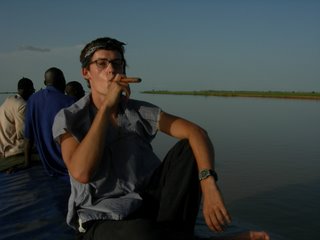
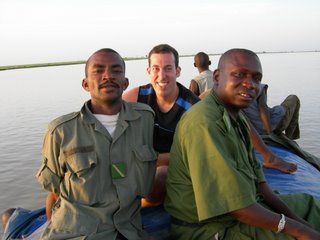
eventually we got underway, and celebrated by climbing up on the roof of the boat and smoking a cigar. once out of mopti even a little distance, the scenery was amazing, very green, punctuated by small mud towns and people in small boats. on the roof of the boat, we made friends with the gendarmes, who told us, in confidence, that they had stashed some automatic weapons on board to protect the boat in case of any pirates. so, when they asked for by address so that we could become penpals, i actually gave them the address of the republican flophouse. justin, who got sandwiched, may not have had such a ready excuse.
mali 3: daytrip to djenne
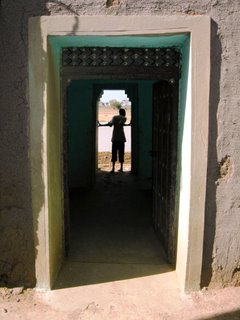
djenne's an old town with lots of great muslim architecture, all in mud. it has a great big library of islamic texts and many large mansions as well, all of which bear windows and doors in the moroccan style - heavy wood with ornate metal fastenings and embellishment, for the unsafe times.
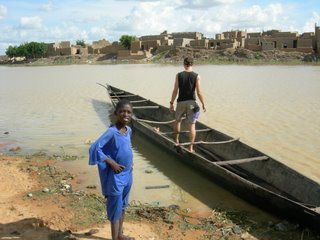
one of the neat things we did in djenne was take a pirogue across the river (djenne is on an island, although we heard that during the dry season there is sometimes a land bridge to the mainland) to one of the small bozo ethnic group fishing villages. one of the reasons it was fun because the pirogue might sink at any moment!
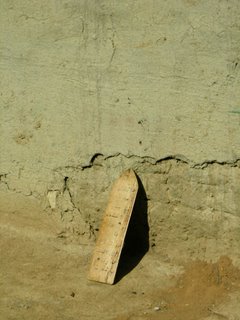
once back from the pirogue, we went walking through the old quartier of djenne, much like we had in mopti - the sight of a group of white tourists in the neighborhood was probably rare enough - it would be like seeing a bunch of people exploring the alley in front of casa quirk-cantrell and taking pictures - but i found the old quartier fascinating - djenne, and mopti before, are medieval in their design, which basically means no design at all - houses are piled on top of each other and streets are narrow and twisting. and then you would walk through this shoulder-width alley and stumble into a square shaded by a large tree, in front of the chief's compound or something. there were also many koranic schools, children seated in a noisy room writing in arabic on wooden tablets.
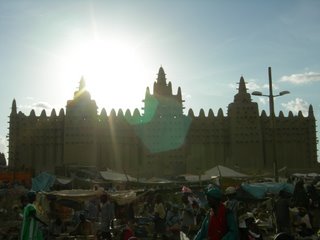
4. djenne, a few hours south of mopti along the river, is known for its large mud mosque; but i think it should also be known for its market, which was large and very lively. we got there pretty early in the morning and the market was already super hopping; so, we had as yet no idea what the day portended.
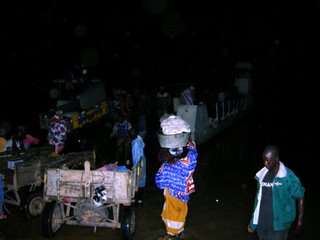
5. when we tried to leave djenne, we did our usual negotiating game at the taxi gare in front of the mosque. but there was an air of desperation as we discovered that only one taxi was going back to sevare, and it wasn't leaving anytime soon. we eventually agreed to each pay two places in the taxi to allow it to leave earlier. but somehow, we were oblivious to the fact that
it was market day in djenne
that djenne was basically on an island when the river was up
that we had crossed a ferry to get over
and that it was getting dark.
the combination of these things meant, of course, that everyone who had come to town for the market would be trying to get off at the same time; and it began to rain as if to remind us how poorly we had planned.
by the time our taxi finally left, and finally got to the ferry, there was long line of cars, trucks, and mule carts waiting to cross. the loading was intriguing: when the ferry pulled up to the shore (about 10m out) horsecarts and travelers on foot plunged recklessly into the river in an attempt to get on it. each ferry crossing took about 30-45 minutes one way; we were in for quite a wait.
drivers and drovers settled in around fires being lit by the river side; before long, the fires were the only source of light short of the neon blink of mobile phones. a crush of horse carts waiting at the water's edge to get on the ferry - thinking that the ferry counldn't possibly run late enough to get everyone across, we nervously planned to encamp on the riverbank. not entirely unjustifiably, in fact: just before the light died completely, the ferry came over to our side, picked up a massive truck full of goods and people, some horsecarts, etc. and started to pull away from the shore. it got like20 feet out and seemed to founder. the engines killed. it rotated listlessly, leaning heavily to one side - and it looked like it was drifting down the river; well, so much for getting back to sevare!
we weren't very optimistic about the prospect of the ferry being fixed right then, given how late it was. but, it turns out, the ferry was just turning around, after it had already left the bank, to pick up some government functionary who had to get across the river
right now. yet even as we cursed the inequity of elite privilege, i confess the continued operation of the ferry was quite a relief. when it came to our turn to cross, a few hours later and very latedark, we went in two stages: sarah, winnie, justin and i waded onto the ferry while chris and alex waited with the taxi, just unable to fit on this go. the ride across was smooth, and we quickly slipped out of side into the middle of the river; it was only a few hundred metres, but as soon as you left sight of the encampment around the bend, the water spread out infinitely in all directions; the captain and crew used a flashlight code to navigate, which was quite impressive in its efficacy.
alex fell in the river when he was trying to get on the ferry, which was funny. well, until we realized this his camera didn't work any more. we found this out after waiting for alex and chris some hours on the other side of the river, convinced the ferry had decided to stop running. it was a beautiful night, to sleep by the river bank beneath a tree on a mat. but no: they arrived, we left, and the ride back to sevare was nervewracking as only a high speed race through the middle of the night with scant headlamps on bad roads can be.
mali 2: mopti, city of la griffe
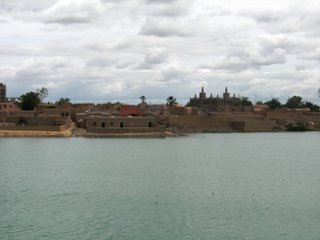
1. mopti is sort of like a regional capital, a beautiful city situated on an inland delta of the niger river - the old quarter streets snake among substantial mud-brick mansions and dilapidated mud-brick compounds. the new quarter port is extremely active with small hand-poled pirogues and larger, motorized pinasses. besides walking around the town, we were in mopti to negotiate passage by riverboat to timbuktu, a 3 day journey.
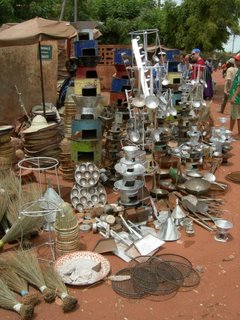
whereas most african towns (well, small ones) have one market day per week, mopti is a daily center of commerce, everything from slabs of salt caravanned from the sahara by camel to more mundane forged metal cooking implements. in mopti, as everywhere in africa, prices are not fixed, but fluctuate according to relationships and bargaining fierceness; there was a floor price for white people which we could never negotiate below - they would rather lose the sale. it was exhausting but sort of fun.
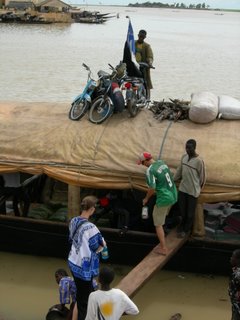
we went to examine the boat that was leaving the day we wanted (tuesday) for timbuktu - it seemed like a pretty good deal - three days of transport, including meals, and the six of us would get a whole "compartment" that normally seats about 20 people. of course, the boat wouldn't leave until it was full of cargo, which at this point it is not. they use these boats to transport largely millet in huge 50kg sacks and bags of cement. these would be loaded in the hull up to the gunwales and upon them we would sleep. sacks of millet - cozy!
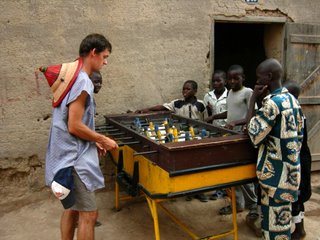
after we negotiated the boat, we took some time to wander the old quarter, home to the grand mosque and a quartier of large mansions. like DC, the wealthy live shoulder to shoulder with the destitute. we also took time out to school some little kids in foosball.
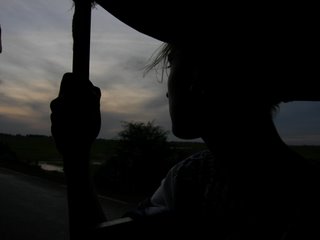
we left mopti in the evening, content with our plan to travel to djenne on the morrow and return to catch the boat to timbuktu the subsequent day. at this point, we were doing ok: we were staying at an inn run by a former missionary who harbored colonial aspirations - but, he was attuned to the health needs of foreign travelers, and made us mexican food and indian curry, all you can eat, for about 10x the price of african food - but, he had a pool. and it was worth it!
mali 1: ouagadougou to sevare
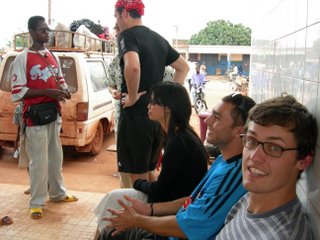
taxi stand at ouahigouya: it's about the middle of the day, and
we've been traveling since 6 in the morning on a bus. now, because we
heard rumors that roads were washed out due to rain, the bus has
declined to continue further and we have to catch the bush taxi!
that's our taxi in the background, a mini van which will eventually
hold 16 people + gear.
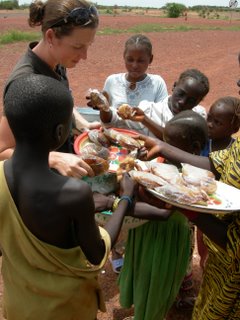
sarah beset by vendors at the burkina/mali border. the
border was interesting, because the burkina and mali checkpoints are
about 20km away from each other, making the land between them
something of a no-man's land (it was all desert anyway). the frontier
itself is a mud shack in the middle of nowhere, where girls presumably
from nearby villages hang out all day to sell peanuts, bananas,
sorghum doughnuts, etc. to passersby.
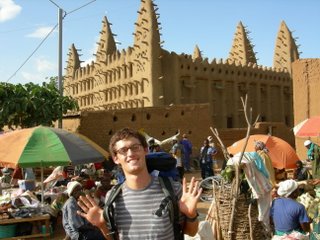
the mosque in koro, our second waypoint on the way to mali and our
first stop in mali itself. this is the first of many mud mosques we
would see. in koro, we negotiated with a guide for a later stage of
the trip, not quite sure if he actually was who he said he was.
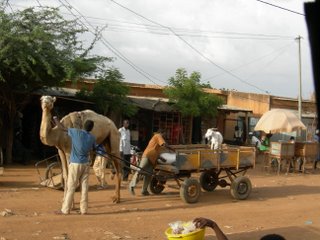
already, things were somewhat different that we were used to.
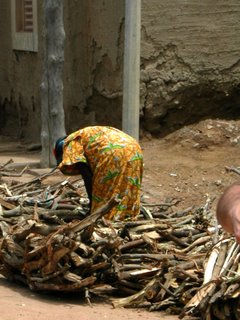
a firewood vendor along the side of the road. one of the things
that makes traveling slow is when the driver of the bush taxi decides
he needs some charcoal or firewood and pulls over capriciously in this
or that small town. we ended up making it into sevare at about 10pm,
16 hours after we left ouaga.
san sebastian, january 24, 2004
san sebastian in the winter is a quiet city by the sea, large but not menacing. its buildings are of nearly uniform height and in the narrow streets of certain districts rise like delicately sculptered walls. walking through the parte vieja at night can be like navigating an ancient, deserted maze. the height of the buildings and angular streets disguise the relatively small size of the old city, which sits astride a spit of land between the rio urumea and the concha. the buildings are similar enough that geographic confusion is a common sensation. small signs dart out from over doorways indicating this or that bar or restaurant, and all of them in the cartoonish basque script.
the wind picks up as you near the waterfront and a stone arch through which boats are visible, channeling down the streets, destroying umbrellas and flapping coat tails, until you see a yellow light at the base of a stone stair which becomes, in that instant, the most appealing sight of warmth and comfort ever seen, which it would not be if not for the harshness of the weather. thereby, the concept of interior space is directly related to the outside. in this fashion the imposing facade of buildings and labyrinthine streets collapses into tiny cave-like rooms and narrow staircases, segmented flats, single beds pushed together and filling a room.
Quiet Journey
I remember reading a travel narrative about dining in Spain and thinking The best job in the world is to be paid to travel, eat, and then write about it. The writing was bad, however. And an article I read later in the New York Times seemed to be more of a boondoggle for a well-known columnist and her sister than a true exploration of Aruba on $2,000 a day. I cannot make guarantees as to the quality of writing on this site, but I figure If those clowns can do it for money, we can do it for free.















































